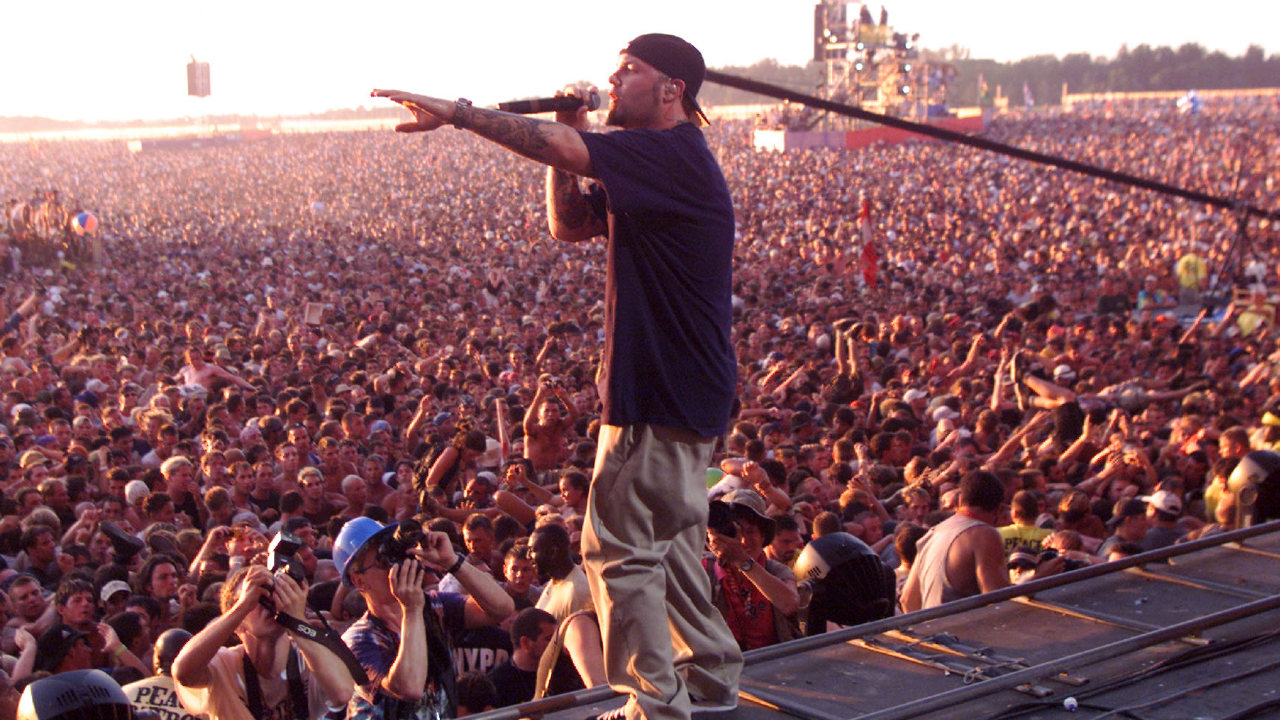
For some people, it’s the definitive anthem of the nu metal era: a perfect distillation of metal’s wildest and most colourful period. For others it is the exact moment that that movement jumped the shark, dropping it into farcical, dunderheaded, frat-boy nonsense. Whatever your personal thoughts, Limp Bizkit’s Break Stuff is inarguably one of the most instantly recognisable anthems in metal, a quarter of a century after its release.
In 1998, Limp Bizkit became hot property, thanks to their rather obnoxious cover of George Michael’s Faith becoming an unlikely MTV hit. Their mindset afterwards, when they went into NRG Recording studios with Pantera and Soundgarden producer Terry Date for album two, was to prove they weren’t just a cover band. Nor did they want to be seen as up-and-comers riding Korn’s coattails.
“Too many people started calling us Baby Korn,” guitarist Wes Borland told Guitar World. “It’s time to leave the mother’s nest.”
Borland claimed that he and his cohorts hadn’t been musically influenced by the nu metal godfathers. But, the Bakersfield crew certainly did impact the sound of the second Limp Bizkit album in one respect: the guitarist decided to use seven strings, as popularised by Korn, for the first time on the then-forthcoming record.
This move would be crucial to helping Bizkit nail the deeper, downtuned sound of what would become one of their most important songs: Break Stuff. Where debut Three Dollar Bill Y’all was a rougher, rawer effort produced by Ross Robinson, Bizkit hoped the followup would be a more polished and palatable, yet still-heavy, counterpart.
“We’ll be leading our own pack,” vocalist Fred Durst told Kerrang! in early 1999. “The beats are tighter and the riffs are more straightforward and powerful.”
This proved to be true. Released on June 22, 1999, Bizkit’s second album, Significant Other, was the smash that they’d dreamed of. It entered the US Billboard Chart at number one, then became the ninth-best selling album of 1999 in the States and sold 16 million copies worldwide.
With clearer production, some rough edges smoothed off and some serious song power, it’s no surprise that Significant Other comfortably outstripped Bizkit’s debut. The first singles from the album were the more anthemic and melodic likes of Nookie, Re-Arranged and N 2 Gether Now – but, when Bizkit were looking for a more aggressive final single, there was one obvious choice. Break Stuff was released on May 2, 2000, perfectly timed as nu metal’s ascent into the mainstream was peaking.
From the second Durst’s now iconic “It’s just one those days…” ushers in the song’s simplistic message of allowing yourself to give in to feelings of impotent anger, Break Stuff hit different. It also hit in such a way as to become an instant crossover smash. The song’s riff and grove were instantaneous, as was its massive chantalong chorus. The music video courted the mainstream, featuring guests from Korn’s Jonathan Davis to Snoop Dogg and Pauly Shore. The single sold 600,000 copes in the UK alone as a result, while the clip won MTV’s award for Best Rock Video in 2000.
However, even before being officially released as a single, Break Stuff was already well-known.
Limp Bizkit’s set at Woodstock ’99 on July 25 has become one of the most controversial and debated of the modern era. The festival was already a melting pot of sizzling tempers before the band took the stage that weekend. The weather was oppressive, shade was scarce, food and water were overpriced. Then Break Stuff and its cries for catharsis struck, and everything boiled over.
Some insist Fred unwittingly inspired much of the melee. The frontman claimed to be unaware of how serious things had got as he told the crowd, “Take all that negative energy and let that shit out of your fucking system.” Rioting, sexual assault and criminal damage ensued, then endured for the remainder of the weekend. Woodstock ’99 is now shorthand and the measuring stick for how horrifically a weekend of music can go.
Durst spent many years after the festival on damage control. He told Metal Evolution in 2011: “I don’t think [the crowd] understood that I meant, ‘OK, let’s get rid of all that negative energy so we can bring positive in.’ That means start jumping – jumping and singing. It doesn’t mean start raping and burning the place down. That’s definitely not what I meant.”
However, in the intervening years, documentaries and interviews have redressed the balance of who and what was to blame for the Woodstock nightmare. While, yes, Break Stuff was an incendiary song, you can’t ignore the circumstances beforehand that already got the audience into such a tense collective headspace. Limp Bizkit were the wrong band at the wrong time.
For those who can separate the song from the anarchy of summer 1999, Break Stuff persists as a club-metal favourite: a fantastically fun, catchy song about ridding yourself of unwanted negative energy. It was, rightfully, one of the definitive anthems from one of the most enduring bands of the nu metal era. It’s also still being discovered and adored by young people the world over.
25 years on, sometimes we still have “one of those days”.








